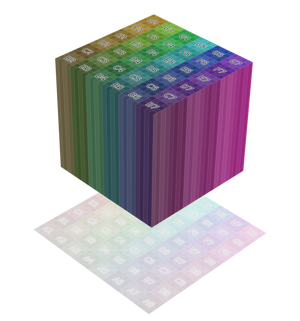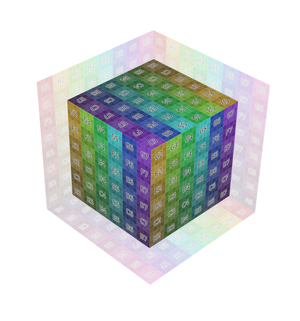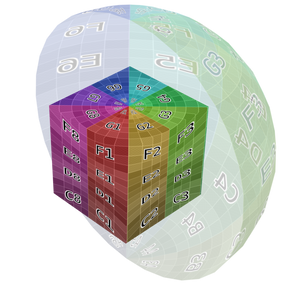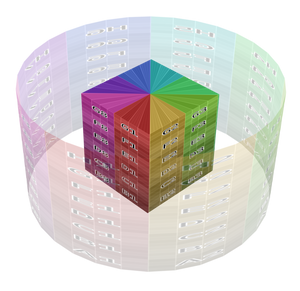图像纹理
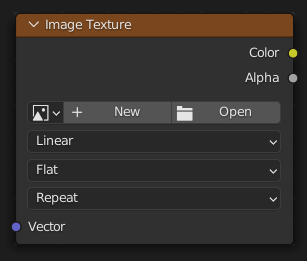
用于将图像应用为纹理。
输入
- 矢量
3D coordinate that's projected onto the 2D image using the selected Projection method. The node then outputs the color and alpha at this projected point.
This slot is usually connected to an output of the 纹理坐标节点. If left unconnected, the coordinate is taken from the object's active UV map (with Z = 0).
属性
- 图像
要使用的图像数据块。
- 插值
放大或缩小图像的渲染方式。
- 线性:
普通插值。
- 三次型:
更平滑、更高品质的插值。凹凸贴图可以此获得最佳效果。
- 最近:
No interpolation (nearest neighbor). Useful for rendering pixel art.
- 智能:
仅限 Cycles 仅用于开放式着色语言。放大时使用三次插值,缩小时使用线性插值,以获得更好的性能和清晰度。
- 投影
How to project Vector onto the image for arriving at a color.
- 平展:
Place the image in a unit square (stretching from (0, 0, 0) to (1, 1, 0)) and project the Vector vertically onto it. This projection is typically used in combination with UV maps.
- 方框:
Place the image on each side of a unit cube (stretching from (0, 0, 0) to (1, 1, 1)) and project the Vector onto this cube, along the axis that's closest to the mesh normal. This projection is commonly used in architectural models considering these have lots of box-shaped objects.
- 混合
Rather than projecting onto just one side (which creates sharp transitions), project onto multiple sides and blend the results together. The higher the value, the more blending and the smoother the result.
- 球形:
Wrap the image around a sphere with origin (0.5, 0.5, 0.5), and project the Vector from this origin onto this sphere. This projection is, of course, perfect for spherical objects such as planets, and is also useful for organic objects.
- 管形:
Wrap the image around a cylinder with base (0.5, 0.5, 0) and height 1, and project the Vector horizontally from the central axis onto this cylinder. This projection is useful for a label on a bottle, for example. However, it's not suited for the top or bottom side of objects.
- 扩展(名)
How the image is extrapolated if Vector lies outside the regular (0, 0, 0) to (1, 1, 1) bounds:
- 重复:
在水平和垂直方向上重复图像(拼贴)。
- 扩选:
通过重复边缘上的像素来扩展图像。
- 剪辑:
剪切到原始图像大小并将所有外部像素设置为透明的黑色。
- 镜像:
水平或垂直往复翻转图像。
- 源
图像的类型(单张图像或影片等)。另见 图像设置。
- 帧
How many frames of the Movie-type image (video) to play. Past this point, the video will be paused (unless Cyclic is enabled).
If you want to play the whole video, you can click Match Movie Length in the Image Editor's Sidebar, then copy the Frames from there to the node.
- 起始帧
开始播放视频的场景帧。
- 偏移量
将视频偏移到较早时间点的帧数。(换句话说:跳过视频开始时的多少帧。)
Hint
Blender plays video textures at the scene framerate, not their original framerate, meaning they'll be faster or slower than intended if these framerates don't match up. You can put a Driver on the Offset to work around this. Simply type the following into the field, replacing StartFrame, VideoFrameRate and SceneFrameRate by their respective numbers:
#(frame - StartFrame) * (VideoFrameRate - SceneFrameRate) / SceneFrameRate
- 闭环
在最后一帧后重新开始,以创建一个连续的循环。
- 自动刷新
Update the video texture in the 3D Viewport when moving through the timeline.
- 色彩空间
The Color Space the image file was saved in. See Image Settings for details.
- Alpha
输出
- 颜色
RGB color from image. If the image has transparency, the color is premultiplied if the Alpha output is used, and unpremultiplied (straight) otherwise.
- Alpha
图像的 Alpha 通道。
示例
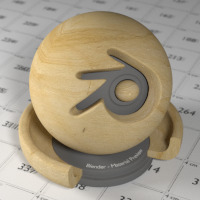
图像纹理来自 GoodTextures.com。
